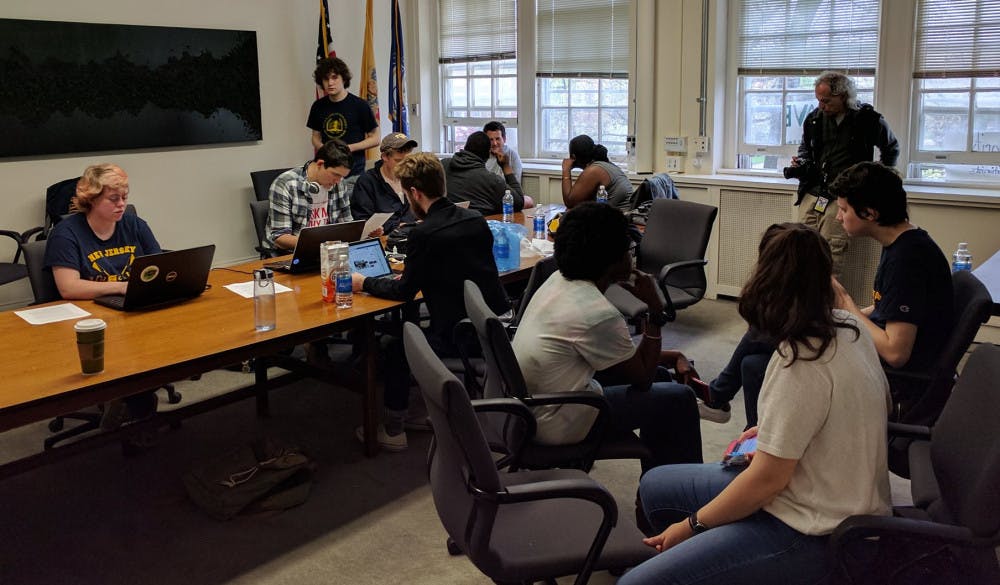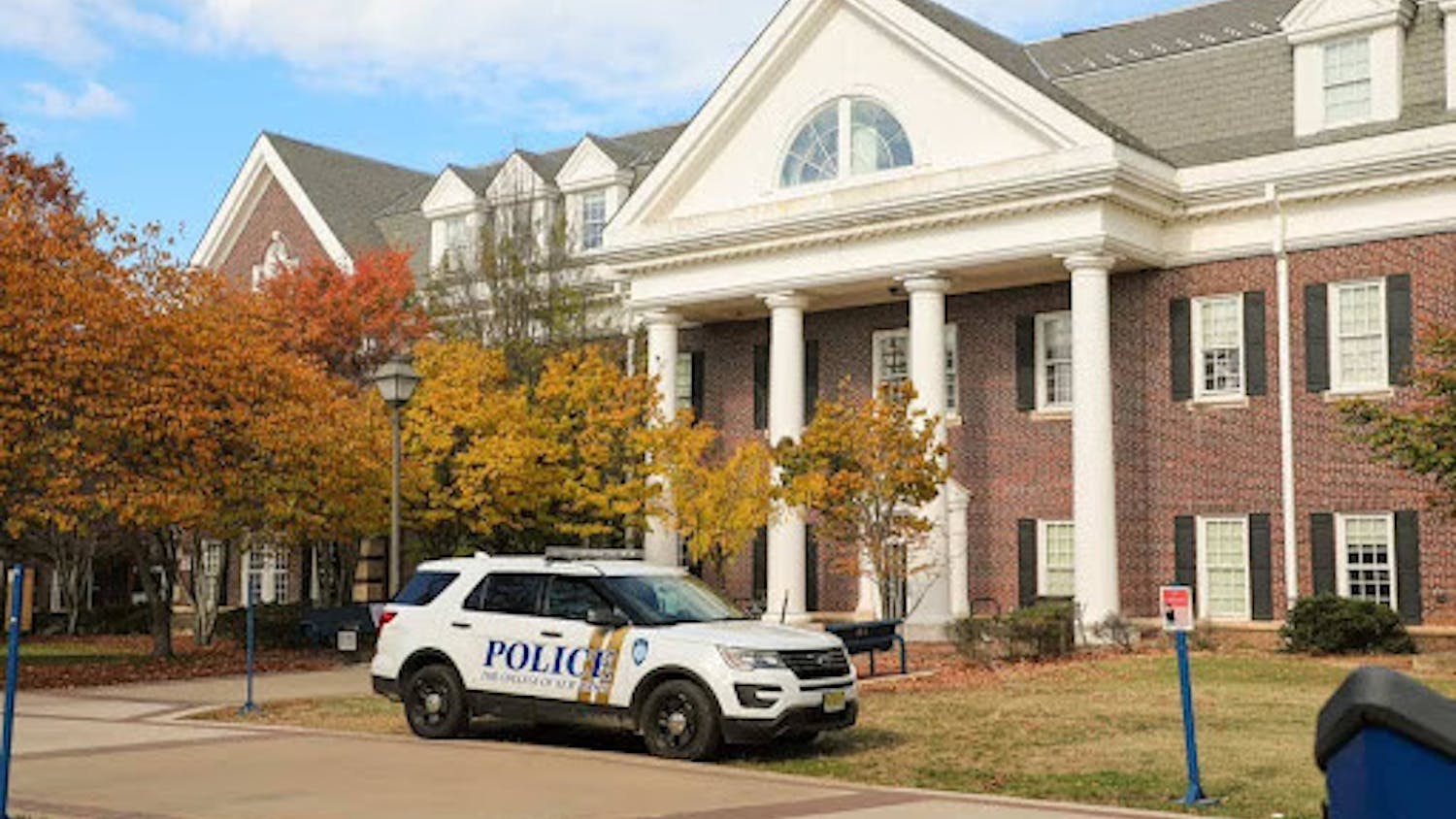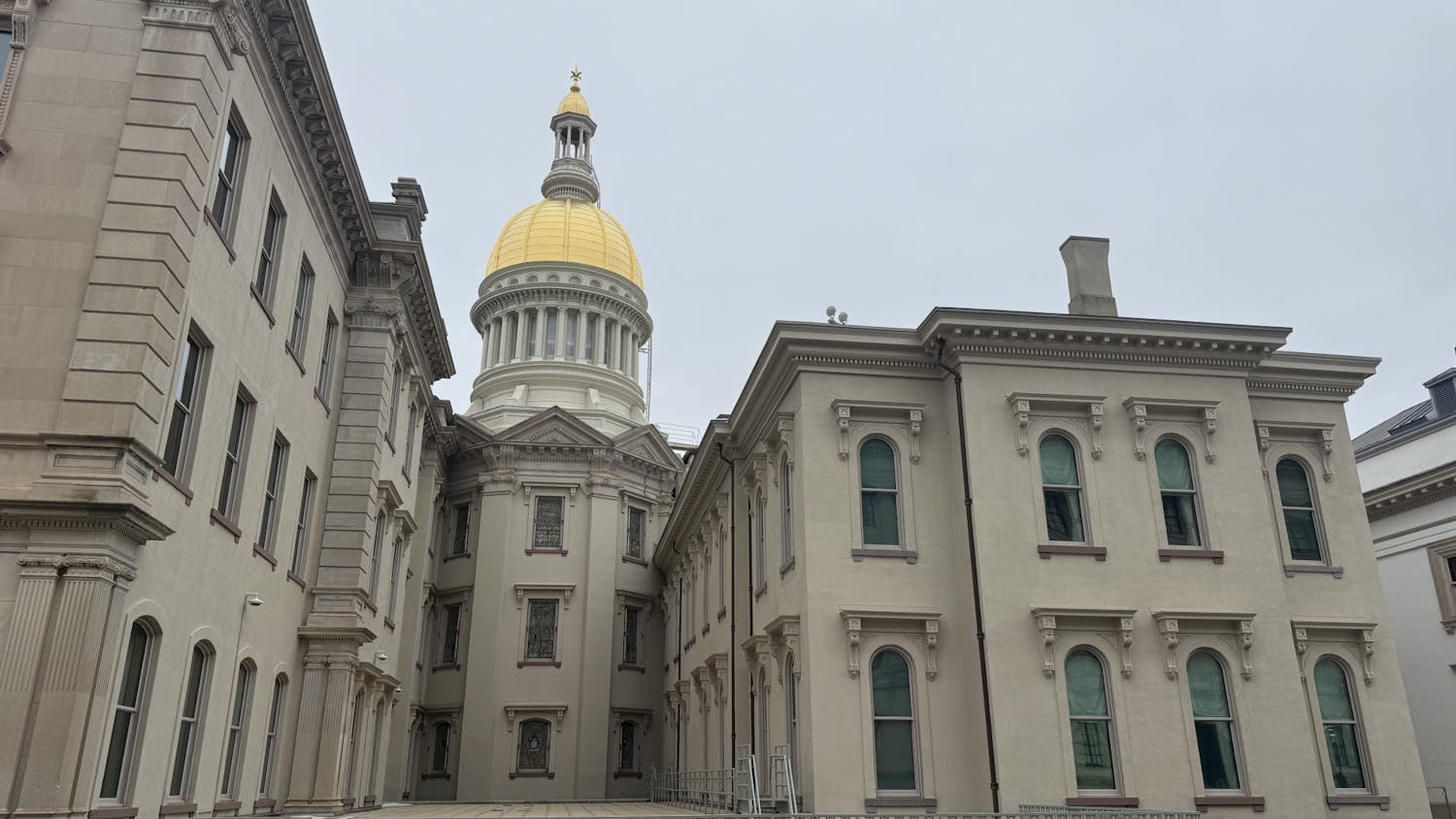By Michelle Lampariello
Nation & World Editor
Members of the TCNJ Committee on Unity engaged in a sit-in for over 24 hours to fight the closure of the TCNJ Clinic and to support the renaming of Paul Loser Hall.
TCU occupied a Green Hall conference room from 10:00 a.m. on Wednesday, April 26, to approximately 12:00 p.m. on Thursday, April 27.
Students involved in the protest believe that not renaming Paul Loser Hall and closing the TCNJ Clinic are “Different Symptoms of the Same Problem,” according to flyers posted around campus. TCU believes that both Loser Hall and the closure of the TCNJ Clinic reflect the College’s disconnection with Trenton, N.J.
“I think that disconnecting programs that were directly helping the Trenton community demonstrates that we don’t really care, or don’t feel obligated to be connected to Trenton anymore,” said Keller Gordon, a sophomore English major and sit-in participant.
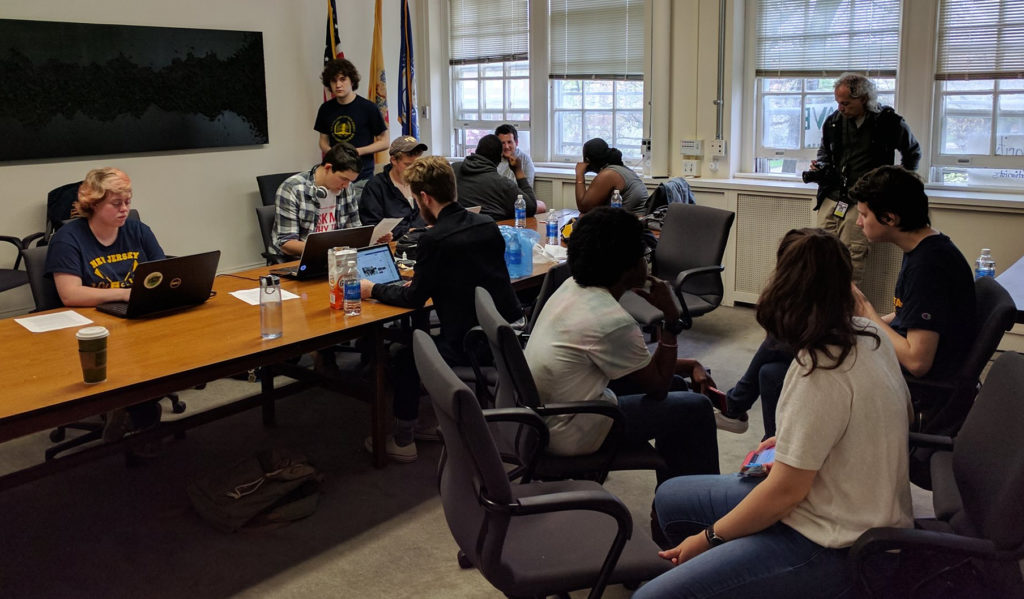
College President R. Barbara Gitenstein told The Signal she hopes to work with students in order to foster a better relationship with Trenton and establish an ongoing dialogue regarding campus issues.
"I met with several students yesterday in my conference room," Gitenstein told The Signal. "We began the meeting with them sharing a document that delineated their concerns regarding TCNJ's relationship with Trenton and the closing of the TCNJ Clinic. I made clear to them that I would have met with them had they simply reached out and requested a meeting.
"I commend the students for their commitment to making a difference in their world and the community and I hope that we can work together to assure that improvements are made in communication, in relationships with Trenton, and in continuing to enhance our mental health services for our students,” she added.
TCU presented six demands to Gitenstein, the first of which was “an acknowledgement of The College of New Jersey’s intentional and systematic erasure of Trenton from its name, history, and advertising,” according to an official list of demands produced by TCU.
Additional demands included “a reversal of the closure of the TCNJ Clinic” and “an open forum so that the campus and local community can discuss the Clinic and its proposed closure with the administration.”
“TCU chose to take on the Clinic as its own charge, believing in its value as a connection to the community in which the College exists,” said Jennifer Sparks, director of the TCNJ Clinic. “This speaks to the importance of the Clinic on campus.
“We were surprised by TCU’s decision to fight for the Clinic, and at the same time incredibly honored and grateful for the support and awareness it has brought to our community,” Sparks added.
Gitenstein responded to TCU at approximately 3:00 p.m. on Wednesday, April 26, with a written statement after she held a brief meeting with the sit-in participants.
“TCNJ President R. Barbara Gitenstein met with students this morning who were staging a sit-in in her conference room,” said Luke Sacks, head media relations officer for the College. “The students had not requested a meeting with the president prior to the sit-in. Had they requested it, the president would have certainly met with them.”
Gitenstein acknowledged concerns about both the TCNJ Clinic and Loser Hall in the written statement.
“I agree with your concerns regarding the troubled historical and current relationship between The College of New Jersey and the city of Trenton,” Gitenstein wrote. “Because of my agreement with these concerns, I named ‘The College of New Jersey Advisory Commission on Social Justice: Race in Educational Attainment.’”
Gitenstein also responded to TCU’s concerns for the TCNJ Clinic.
“We discussed a number of activities we are actively pursuing to ensure that the long term counseling needs of our students are met with the highest level by professionally licensed clinicians,” she wrote. “We expect that these opportunities will also be available to the external community… the needs of our graduate students to accumulate the necessary clinical hours to graduate on time will be met through our current placement process.”
TCU acknowledged Gitenstein’s response as “a great first step in helping to repair the relationship between Trenton and the College,” according to a document produced by the TCU entitled “TCNJ Committee on Unity Response to President Gitenstein.”
However, TCU argues that their demands for the future of the TCNJ Clinic and Paul Loser Hall are yet to be met. Their reasons were detailed in the aforementioned document.
TCU states that Gitenstein has “taken the closure of the clinic as a given” and that “closing such a vital institution that provides mental health services to the Trenton community is once again a slight against Trenton.”
With regard to Paul Loser Hall, TCU claims that in her response, Gitenstein “merely restated that she has already created a commission to address this problem” and did not “outline the further responses to this issue and receive input from residents and students on how to go about repairing this relationship (with Trenton).”
In addition to the sit-in organized by TCU, over 1,300 students and community members have signed a petition entitled “Save the TCNJ Counseling Clinic: Wellness is Worth It!”
“The emphasis behind the petition is basically to have the administration know our disappointment that the key constituents were not sought for input in the decision,” said Jennifer Peck-Nolte, a supervisor of students in the Counselor Education Program and the author of the petition. “We felt that those that are most impacted by the decision to close the TCNJ Clinic are students and clients. Neither of those groups had input.”
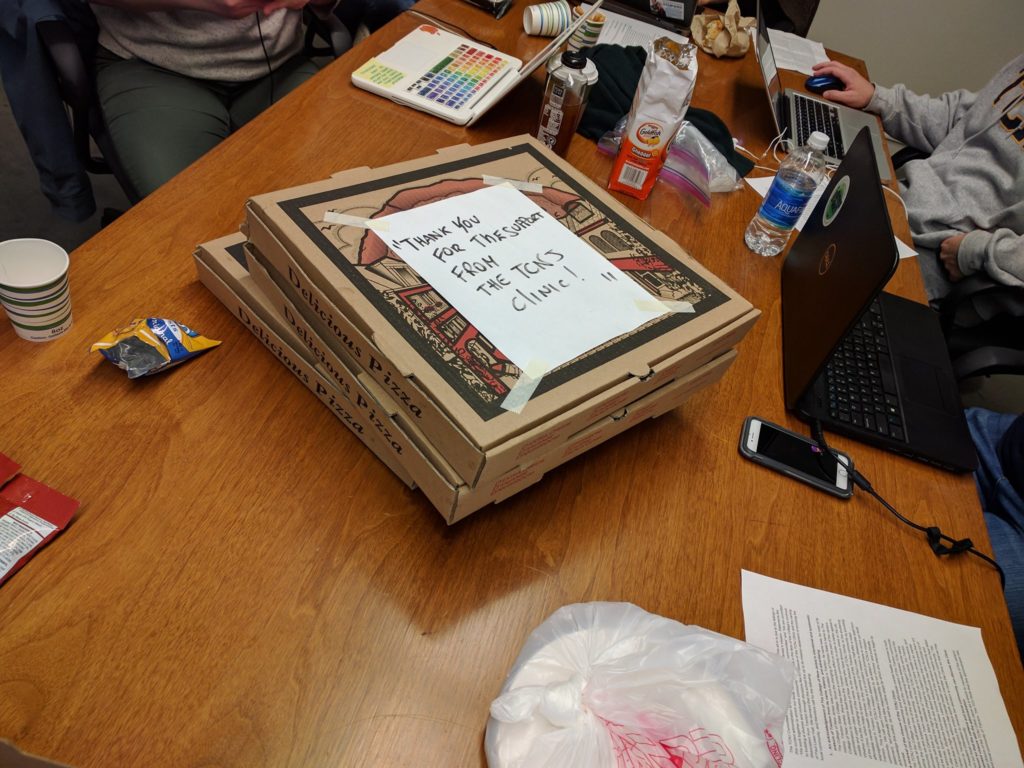
The low cost of mental health care at the TCNJ Clinic made it a popular resource for students and community members.
“I’ve used the clinic for a year and a half now, and I honestly wouldn’t be here at TCNJ if it wasn’t for the affordable mental health care that they provided,” said Ariana Chuba, a junior history major and sit-in participant. “This is affordable not just to TCNJ students, but to the community, and they’re shutting it down… (the College has) been continually distancing themselves from the Trenton community.”
TCU says that the closure of the Clinic will cut off access to affordable mental healthcare for Trenton residents who may not be able to afford services at InFocus Urgent Care. TCU also maintains that the closure of the Clinic, compounded with the lack of a new name for Paul Loser Hall, highlights the College’s strained relationship with Trenton.
“Both of these items are symbolic of a greater distancing that the College has done over the last 20 years,” said Chris Loos, a sophomore history major. “Since we are one of the major schools in the area, it is our duty as community leaders to respect and work with the people of Trenton.”
While long term mental health care will be available at InFocus Urgent Care, which opens this summer in Campus Town, opponents of the TCNJ Clinic closure maintain that the Urgent Care will not be as affordable as the clinic.
“As with most private clinical settings, InFocus requires insurance. All students are required by the College to carry insurance, but that does not mean they have access to mental health. Insurance often requires a copay or includes a large deductible, both of which can be barriers to receiving treatment,” Sparks said. “This is no different for community members, same issues apply. The only difference is that community members, especially in this area, are often uninsured. And who thinks to go to Urgent Care for therapy?”
TCU provided a closing statement at the end of the sit-in, which stated: “Until the TCNJ Committee on Unity feels that our demands are adequately addressed and met by the administration of The College of New Jersey we will not yield in our pursuit for justice.”


